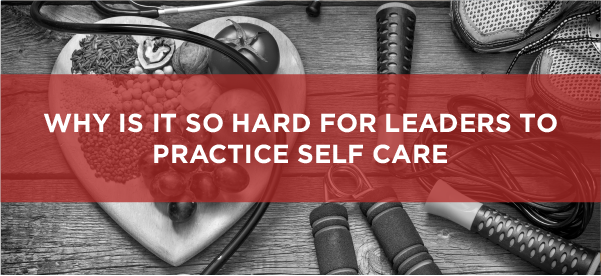And it’s not just leaders. Many corporate high performers struggle to care for themselves well – myself included at times. My healthy habits – restful sleep, good nutrition, diligent hydration – are sporadic at best, and my exercise routine is not routine at all. I also find that I am often a very shallow breather throughout the day, even while knowing the benefit of intentional breathing.
But awareness isn’t enough. We must work through some limiting beliefs we have about caring for ourselves. What are some of the more common limiting beliefs when it comes to self-care for leaders?
- They think busy is normal.
The badge of busy is worn by all.
My business partner Ralph Simone and I discussed this idea of being “whelmed” as compared to under- or overwhelmed, reframing the “busy” paradigm in a podcast you can find here.
But no matter what we call it, we are not managing our energy effectively. We utilize basic time management practices such as time-blocking for work-related commitments, yet fail to utilize those same strategies for “us-related” issues. Blocking time for self-care can and should be one of the things we get done, too.
- They have a hard time saying no and keep saying yes out of a sense of doing better, caring, and service.
As the Stoics practiced, developing your essential criteria for what you say yes to is a great way to ensure that your time and energy are devoted to what matters most. If the request made to you doesn’t fit your criteria, learn to say “no” or “not yet” if you think the request may fit better at a later date.
When we practice saying no, people start to respect us more! Most leaders are concerned with disappointing others by saying no; the fact is, while some people will be temporarily disappointed, respect is often built and reinforced by holding up healthy boundaries.
- Self-care doesn’t feel productive.
Between the choice of getting some work accomplished or taking a walk or jog, the work accomplishment feels more productive. Choosing between grabbing some fast food and taking the time for healthy meal preparation – like washing and chopping veggies for a fresh salad, or cutting up some fruit – we often opt for the timesaving fast food in the name of efficiency and productivity.
What we fail to remember when making those choices is that taking care of ourselves is the key to higher performance – and thus better productivity and efficiency. The shortcuts we take – whether fast food, eating at our desks while we work, or not bothering to breathe deeply through the day (that one is aimed at me) – actually result in less productivity, not more.
- Self-care hasn’t been habitualized or ritualized.
James Clear, in his book, “Atomic Habits,” writes, “Habits are the compound interest of self-improvement.” But starting and maintaining habits isn’t automatic; Clear also shares that “the seed to every habit is a tiny decision.” We must decide to start the habit and then connect to the deep meaning that habit has for us so we can transform habits into rituals.
Rituals are those actions and behaviors we do or partake in that have deep meaning. They may become automatic, but they never lose their deep meaning. Connecting habits to deeply held beliefs and emotions is key to ritualizing your self-care. And when self-care is ritualized and normalized at the leadership level, productivity and efficiency – as well as our overall health – will benefit!

Comments (0)